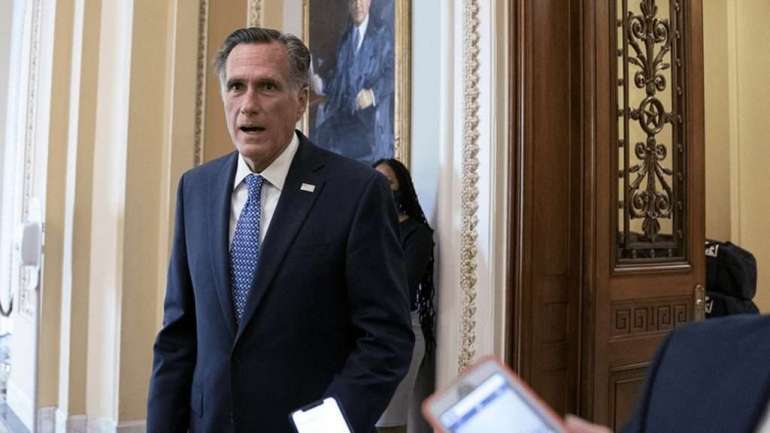Romney backs vote on Supreme Court nominee, clearing way for Trump

“My liberal friends have over many decades gotten very used to the idea of having a liberal court, but that’s not written in the stars,” the Utah Republican told reporters after this decision. He called it “appropriate for a nation that is … center-right to have a court which reflects center-right points of view.”
Given his criticisms of Trump and vote to remove him from office during the impeachment trial earlier this year, there was some question about where Romney would come down on a Supreme Court nominee. And though Romney’s position doesn’t mean Trump’s yet-to-be-named nominee will definitely have the votes to be confirmed, it does mean McConnell and Trump can move forward without delay.
Trump tweeted Tuesday that he plans to announce his nominee on Saturday; Amy Coney Barrett and Barbara Lagoa are seen as the top contenders. A meeting Trump had with Barrett on Monday went very well, according to a Republican close to the White House. “Trump thought she was very smart, very prepared, held herself with lots of dignity and poise,” the person said. Trump plans to meet with Lagoa on Friday.
Senate Republicans on the Judiciary Committee met midday Tuesday to discuss different scenarios for how quickly they can process the nominee. No final decision was made, but a hearing could take place starting the week of October 12, according to a GOP aide. Around the same time as Trump’s tweet, Republicans also decided to wait to announce their schedule until Trump makes his pick, said Sen. Josh Hawley (R-Mo.).
GOP leaders are still mulling whether to try to fill the vacancy before the election or wait until a lame-duck session, but the prevailing view in the party is to move as quickly as possible.
“People are very supportive of the idea of moving forward. In terms of the timing, that’s still up in the air,” said Senate Majority Whip John Thune (R-S.D.). “Speaking for me personally? Yes. I think it would be a good idea for us to move forward [before the election]. But obviously, we have a lot of different members who might have different positions.”
Trump and some Senate allies are pushing a preelection confirmation, though leaders are noncommittal about timing. Thune said it was McConnell’s decision. Romney said he had no preference on timing but also no qualms about conducting a confirmation either before or after the election.
Senate Judiciary Chairman Lindsey Graham (R-S.C.) predicted Tuesday that Trump’s nominee would be confirmed before the election and said he would “keep the process like we had it before” when asked about the length of the confirmation hearing. It would a lightning-fast confirmation by Senate standards and occur exceptionally close to the election.
“My sense is that he is going to wait until there’s an announcement, and then he’s going to make a final decision” on timing, Hawley said.
Other potential swing votes, like Republican Sens. Cory Gardner of Colorado and Chuck Grassley of Iowa, said on Monday evening they do not oppose considering a nomination this year. Only Sens. Lisa Murkowski of Alaska and Susan Collins of Maine have said the seat shouldn’t be filled this close to the election, and without Romney taking that view there’s scant possibility of keeping the seat vacant this year.
Romney said he was merely following the law in making his decision to allow consideration of Trump’s nominee rather than taking a position based on the recent blockade of President Barack Obama’s Supreme Court nominee, Merrick Garland, during the 2016 election. Because the opposition party controlled the Senate in 2016, Romney said, Democrats’ arguments about that move being unfair did not weigh on his decision regarding Ginsburg’s replacement.
Because the president’s party controls the Senate this time around, Romney said it was reasonable for the GOP to move forward in considering Trump’s nominee in 2020.
“It wasn’t unfair because it was consistent with history. It was consistent with precedent, it was consistent with the Constitution,” Romney told reporters. “That the Merrick Garland decision was unfair, and so therefore it has to be made up by doing something which also wouldn’t make a lot of sense — which is saying to President Trump you can’t get your nominee, either — that just doesn’t follow.”
Democrats took a different view. For the second day in a row, Senate Minority Leader Chuck Schumer (D-N.Y.) took to the floor to castigate McConnell and his members. He read Republican quotes from 2016 defending the Garland blockade, throwing them back in the GOP’s face four years later.
“That’s how they justified the unprecedented blockade of President Obama’s Supreme Court nominee. No vote during a presidential year because we have to let the people decide,” Schumer said. “Now: ‘Whoops, didn’t mean it.’”
Marianne LeVine and Nancy Cook contributed to this report.